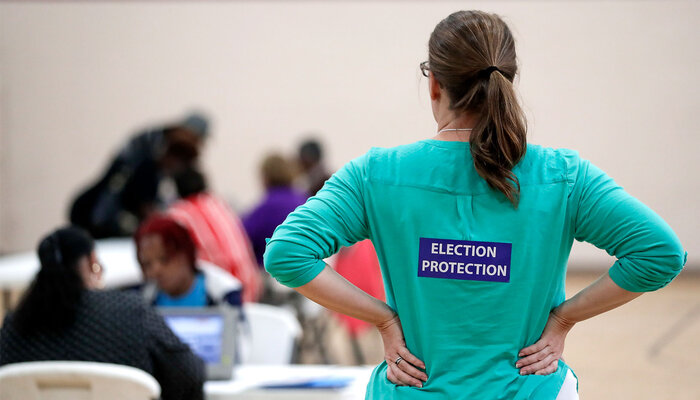Written and Published in Partnership with All Voting is Local.
Election observers, referred to as “political party observers” or “observers” in Ohio, are individuals who monitor polling places and ballot counting sites. While observers play an important role in providing transparency, they can also be a potential source of disruption and intimidation. For this reason, all states have a series of regulations and constraints regarding who can serve as poll watchers and what they can do. Ohio’s rules on observers, which derive both from the state’s election code and from guidance issued by the secretary of state, are:
Appointment
- Under Ohio law, political parties with candidates on the ballot, any group of five or more candidates, or a ballot issue committee can appoint one observer per early and Election Day voting location, and one observer at each board of elections office to observe voting and processing of provisional and absentee ballots leading up to and on Election Day, and one observer for the official canvass.footnote1_pmBjnPsqcgHZMN6sV7vl-CoK5MOQACGEsvt9EFv3bh0_s7oHv4BY3zGu1 Ohio Rev. Code Ann. §§ 3505.21(B), (E); 3505.32(B).
- Only voters registered in Ohio may be observers.footnote2_n2lcb353fEtmvefmmfhWUJ0MN5qnuITMlMvy52sCc20_xWcyCg9vPSaI2 Ohio Rev. Code Ann. § 3505.21(B).
- The county board of elections must receive notification of the name, address, and location at which the observer is to serve prior to observing.footnote3_LVMq9VXvgZH5XpSRYxYc1UEkEDJJUmk2sKMjllxsu60_jNZ7a7QCONEB3 Ohio Rev. Code Ann. § 3505.21(F).
- Observers must take an oath prior to observing.footnote4_LVMq9VXvgZH5XpSRYxYc1UEkEDJJUmk2sKMjllxsu60_sElkSSETE7G34 Ohio Rev. Code Ann. § 3505.21(F).
- Separately, Ohio law permits “post-election observers” during a post-election audit. The post-election observers may only attend public meetings of the local board of elections (these meetings must be publicly noticed in advance), and in no event may they handle ballots during the audit.footnote5_52KGItWb5KeBQzrGi6ITy3PIykJd1mAhdDjj8nR3ek_fIz4jNpabPA05 Ohio Rev. Code Ann. §§ 3505.331(A), (C); and Ohio Secretary of State, Election Official Manual, December 20, 2023, 340–41, https://www.ohiosos.gov/globalassets/elections/directives/2023/eom/eom_fullversion_2023–12.pdf. They are otherwise subject to limitations similar to those that apply to observers at polling places and ballot counting locations.
Role of Observers
- Observers monitor the election process without causing disruptions to voters or election workers. They may watch all proceedings of precinct officials, including the counting and certification of returns, at the polls and ballot counting sites.footnote6_HdSxRTfdKI1c-X9fALrT7kGl36wf2rF7BWlvWDvok_xIIpEdOccMmc6 Ohio Rev. Code Ann. § 3505.21(C).
- Observers cannot challenge a voter’s eligibility at a voting location.footnote7_cMXbTUPoVA13ulOiTpmtbtf5amwpmpl0l3-b2HqMPk_rBqSGtRAtgAx7 See Ohio Rev. Code Ann. § 3505.20; and Manual, 272. More information on the rules and constraints on voter eligibility challenges can be found here.
- According to the secretary of state’s guidance, observers can contact the county board of elections if they observe an issue of concern but must leave the voting area to do so.footnote8_VyCxxYRyW4e1PkWOi23cP-679z53sC5ZyIK-JDcoI68_hcL7DGNbbofH8Manual, 274.
- The guidance also notes that observers may move freely about the location except that election officials may deny observers access to parts of an election office where ballots are not being cast, processed, or counted.footnote9_VyCxxYRyW4e1PkWOi23cP-679z53sC5ZyIK-JDcoI68_cKX95yYqIbEH9Manual, 274.
Prohibited Activities
- Electioneering: All people, including observers, are prohibited from conducting campaign related activities, known as electioneering, within 100 feet of a voting location, and if the line for voting extends beyond the 100-foot buffer, within 10 feet of any voter waiting in line.footnote10_c8Xrl1ktQOzvKiaHpmiIBMnMfg8wPhKS93Msa-fvLoU_aNRKoLm5YAJ710 Ohio Rev. Code Ann. § 3501.35(A)(1); and Manual, 181. This includes wearing campaign clothes or accessories.footnote11_CTBHsD7i-1xGNGjHmEe35lnGrw—NRjAYAfBnlprKNI_dwfOHr6Vq9ww11Manual, 259.
- Carrying Firearms: Observers cannot carry a firearm or other weapon.footnote12_297HFDytDk1eQy4vKj4JGFel9DSYfUilHok3WZcKY_lOzjrxrIkN2w12 Ohio Rev. Code Ann. §2505.21(B); and Manual, 275.
- Intimidation or Influence: Attempting to intimidate or influence a voter is not allowed.footnote13_bcqVl19I9pMA2RdSFJEAc4-WNTWgPDnNUJoch57CoI_rDskv34pospn13 Ohio Rev. Code Ann. §§ 3501.90(A)(1)(A), 3599.01(2). Intimidation can include, but is not limited to, soliciting a voter, coercing a voter to vote or refrain from voting, or coercing a voter to vote or refrain from voting for a particular candidate, question, or issue.footnote14_BDnH1D5NdMSSgrAbuiWRAZeQTEMeGzS2zspFglqqvh8_cCMBzxS2CK2A14 Ohio Rev. Code Ann. §§ 3501.35(A)(5); 3599.01(2). Additionally, it is illegal to attempt to intimidate election officers or prevent them from performing their duties.footnote15_2mXaWHMrsESWXFxgrtrYqjfoBLIG3gGcr-DvKVYtqM_uyojzTT3yQ7y15 Ohio Rev. Code Ann. § 3599.24(3).
- Interference: Observers may not interfere with election workers or slow the operation of election processes. Specifically, it is illegal for anyone, including observers, to destroy property used to conduct elections, to loiter in or about the voting place during the casting and counting of ballots, or to unduly delay or hinder a voter from attempting to vote or voting.footnote16_4khF5XLnEz8WHBuif9ksJUPmA5t17Hn4–4veHnBeaQ_cwKYcDIKDZEH16 Ohio Rev. Code Ann. §§ 3599.24(2), (5), (6), 3599.26.
- Harassment: It is illegal for anyone, including observers, to harass a voter. Harassment includes, but is not limited to, obstructing access to or from a voting location or participating in a riot, violence, or disorder in or about the voting location.footnote17_Fc6qfaopqydVacCUx03zWXhbkiywe1FqE0XX9h6MQU_fRRX8cS1SmyW17 Ohio Rev. Code Ann. § 3501.90(A)(1)(a).
- Voter Interaction: Observers may not interact with voters in a disruptive manner.footnote18_PhNZiCO0xhVkYnorl04w-Ig1srHKST8HW07Ua4RVZc_orR4NxMUEiNT18 Ohio Secretary of State, “Being an Election Observer: Things to Know,” last accessed May 23, 2024, https://www.ohiosos.gov/elections/voters/being-an-election-observer-things-to-know/.
- Handling Election Materials: Observers may not handle any election materials.footnote19_VyCxxYRyW4e1PkWOi23cP-679z53sC5ZyIK-JDcoI68_yekcTJ0JV12319Manual, 274.
- Photography and Video: Observers may not take photographs or videos at a voting location.footnote20_OJXhm1phWQGc9PR5Y4aD1F24UmEkBfAzipkJAohHCFU_js10GaQKQEqH20Manual, 274. Further, observers may not use electronic or communication devices that could impede, harass, or intimidate voters or risk violating voter privacy.footnote21_VyCxxYRyW4e1PkWOi23cP-679z53sC5ZyIK-JDcoI68_q087TxCqyuov21Manual, 274.
- Enforcing the Law: Observers may not enforce the law or advocate for voters.footnote22_VyCxxYRyW4e1PkWOi23cP-679z53sC5ZyIK-JDcoI68_dd7JOMjLoB8122Manual, 274.
Federal and state law strictly prohibit all people, including observers, from engaging in voter intimidation. Any action that makes a voter feel intimidated, threatened, or coerced (including any effort to prevent a voter from registering to vote, voting, or voting for or against any candidate or ballot measure) could constitute voter intimidation, regardless of whether it breaks a specific rule.footnote23_bTJSFleJC9XYhmWBVqV-WyVMxJCGKAgN3m9OrnIrkGk_jsTqM5yyw6MI23 18 U.S.C. §§ 241, 594; 52 U.S.C. § 10101(b); and Ohio Rev. Code Ann. §§ 3501.35, 3501.90, 3599.01, 3599.24, 3599.26. More information on the federal and state laws that protect Ohio voters from intimidation can be found here.
Removal
- Precinct election officials may remove observers who interfere with, impede, or disrupt the election or who engage in behavior that is inconsistent with state law or a secretary of state directive.footnote24_qkOZyxKsg2YryEAJIBYxapfAf-aZcKJ13nZ-iKX7g_vNlWMLSDxBF524Manual, 276.
- If necessary, election officials may contact law enforcement for assistance in removing observers who break the rules.footnote25_feh0fvnUW1txlfEnbV8N8hyekXe1jVufrGmTRowMeM_peoj3kKHefvG25 Ohio Rev. Code Ann. § 3501.33.
End Notes
-
footnote1_pmBjnPsqcgHZMN6sV7vl-CoK5MOQACGEsvt9EFv3bh0_s7oHv4BY3zGu
1
Ohio Rev. Code Ann. §§ 3505.21(B), (E); 3505.32(B).
-
footnote2_n2lcb353fEtmvefmmfhWUJ0MN5qnuITMlMvy52sCc20_xWcyCg9vPSaI
2
Ohio Rev. Code Ann. § 3505.21(B).
-
footnote3_LVMq9VXvgZH5XpSRYxYc1UEkEDJJUmk2sKMjllxsu60_jNZ7a7QCONEB
3
Ohio Rev. Code Ann. § 3505.21(F).
-
footnote4_LVMq9VXvgZH5XpSRYxYc1UEkEDJJUmk2sKMjllxsu60_sElkSSETE7G3
4
Ohio Rev. Code Ann. § 3505.21(F).
-
footnote5_52KGItWb5KeBQzrGi6ITy3PIykJd1mAhdDjj8nR3ek_fIz4jNpabPA0
5
Ohio Rev. Code Ann. §§ 3505.331(A), (C); and Ohio Secretary of State, Election Official Manual, December 20, 2023, 340–41, https://www.ohiosos.gov/globalassets/elections/directives/2023/eom/eom_fullversion_2023–12.pdf.
-
footnote6_HdSxRTfdKI1c-X9fALrT7kGl36wf2rF7BWlvWDvok_xIIpEdOccMmc
6
Ohio Rev. Code Ann. § 3505.21(C).
-
footnote7_cMXbTUPoVA13ulOiTpmtbtf5amwpmpl0l3-b2HqMPk_rBqSGtRAtgAx
7
See Ohio Rev. Code Ann. § 3505.20; and Manual, 272.
-
footnote8_VyCxxYRyW4e1PkWOi23cP-679z53sC5ZyIK-JDcoI68_hcL7DGNbbofH
8
Manual, 274.
-
footnote9_VyCxxYRyW4e1PkWOi23cP-679z53sC5ZyIK-JDcoI68_cKX95yYqIbEH
9
Manual, 274.
-
footnote10_c8Xrl1ktQOzvKiaHpmiIBMnMfg8wPhKS93Msa-fvLoU_aNRKoLm5YAJ7
10
Ohio Rev. Code Ann. § 3501.35(A)(1); and Manual, 181.
-
footnote11_CTBHsD7i-1xGNGjHmEe35lnGrw—NRjAYAfBnlprKNI_dwfOHr6Vq9ww
11
Manual, 259.
-
footnote12_297HFDytDk1eQy4vKj4JGFel9DSYfUilHok3WZcKY_lOzjrxrIkN2w
12
Ohio Rev. Code Ann. §2505.21(B); and Manual, 275.
-
footnote13_bcqVl19I9pMA2RdSFJEAc4-WNTWgPDnNUJoch57CoI_rDskv34pospn
13
Ohio Rev. Code Ann. §§ 3501.90(A)(1)(A), 3599.01(2).
-
footnote14_BDnH1D5NdMSSgrAbuiWRAZeQTEMeGzS2zspFglqqvh8_cCMBzxS2CK2A
14
Ohio Rev. Code Ann. §§ 3501.35(A)(5); 3599.01(2).
-
footnote15_2mXaWHMrsESWXFxgrtrYqjfoBLIG3gGcr-DvKVYtqM_uyojzTT3yQ7y
15
Ohio Rev. Code Ann. § 3599.24(3).
-
footnote16_4khF5XLnEz8WHBuif9ksJUPmA5t17Hn4–4veHnBeaQ_cwKYcDIKDZEH
16
Ohio Rev. Code Ann. §§ 3599.24(2), (5), (6), 3599.26.
-
footnote17_Fc6qfaopqydVacCUx03zWXhbkiywe1FqE0XX9h6MQU_fRRX8cS1SmyW
17
Ohio Rev. Code Ann. § 3501.90(A)(1)(a).
-
footnote18_PhNZiCO0xhVkYnorl04w-Ig1srHKST8HW07Ua4RVZc_orR4NxMUEiNT
18
Ohio Secretary of State, “Being an Election Observer: Things to Know,” last accessed May 23, 2024, https://www.ohiosos.gov/elections/voters/being-an-election-observer-things-to-know/.
-
footnote19_VyCxxYRyW4e1PkWOi23cP-679z53sC5ZyIK-JDcoI68_yekcTJ0JV123
19
Manual, 274.
-
footnote20_OJXhm1phWQGc9PR5Y4aD1F24UmEkBfAzipkJAohHCFU_js10GaQKQEqH
20
Manual, 274.
-
footnote21_VyCxxYRyW4e1PkWOi23cP-679z53sC5ZyIK-JDcoI68_q087TxCqyuov
21
Manual, 274.
-
footnote22_VyCxxYRyW4e1PkWOi23cP-679z53sC5ZyIK-JDcoI68_dd7JOMjLoB81
22
Manual, 274.
-
footnote23_bTJSFleJC9XYhmWBVqV-WyVMxJCGKAgN3m9OrnIrkGk_jsTqM5yyw6MI
23
18 U.S.C. §§ 241, 594; 52 U.S.C. § 10101(b); and Ohio Rev. Code Ann. §§ 3501.35, 3501.90, 3599.01, 3599.24, 3599.26.
-
footnote24_qkOZyxKsg2YryEAJIBYxapfAf-aZcKJ13nZ-iKX7g_vNlWMLSDxBF5
24
Manual, 276.
-
footnote25_feh0fvnUW1txlfEnbV8N8hyekXe1jVufrGmTRowMeM_peoj3kKHefvG
25
Ohio Rev. Code Ann. § 3501.33.






